 |
| |
e-newsletter of the Centre for Environment Education |
|
|
 |
| November 1-30, 2014 |
|
 |
|
 |
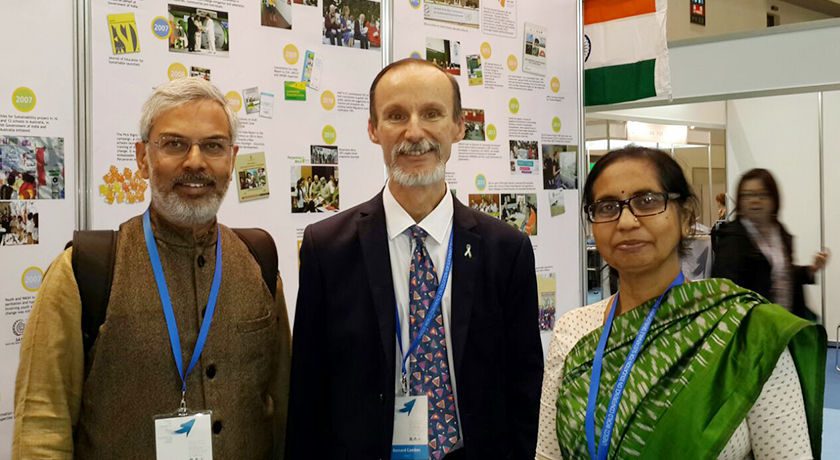 |
| Kartikeya Sarabhai, Director, CEE and Shailaja Ravindranath, Programme Director, CEE, with Bernard Combes, Communication and Information Officer, Section for Education for Sustainable Development, UNESCO, Paris. |
 |
|
UNESCO World Conference on Education for Sustainable Development |
CEE was the Nodal Agency for the UN Decade of ESD in India (2005-2014), and was part of the delegation representing India at the UNESCO World Conference on Education for Sustainable Development, co-organized by UNESCO and the Government of Japan at the Nagoya Congress Centre in Aichi-Nagoya, Japan, on 10-12 November, 2014.
Four plenary sessions and a high-level roundtable were hosted at the Conference, which celebrated the achievements made and identified the lessons learnt in ESD, during the decade. Representatives of UNESCO Member States, NGOs, academia, the private sector, individual experts, and youth and UN agencies participated in the Conference, which also witnessed the launch of ESD: the Global Action Programme (GAP).
CEE’s concept of Handprint was the only project in Education for Sustainable Development (ESD) shortlisted from India at the World Conference. The Centre was also part of the various Conferences organized during the 3-day period, including the Global RCE Conference, Higher Education for Sustainable Development - Beyond 2014, Celebrating a Decade of Action - Contribution of ESD in meeting the Internationally-agreed development goals, Accelerating Action for SD, and Setting the Agenda for ESD beyond 2014 - Sustainable Development Goals.
Exhibitions reflecting the work done in ESD were put up by CEE, and these included the CEE Exhibition - ESD: Innovating, Partnering, Demonstrating, Mainstreaming and Impacting, the ESD India Exhibition, Handprint project exhibition and the poster exhibition on ‘GCS - Connecting Schools Naturally’. ‘Handprints - Action Towards Sustainability: Sharing New Experiences and Making New Partners’ was a side event at the Conference.
|
|
 |
|
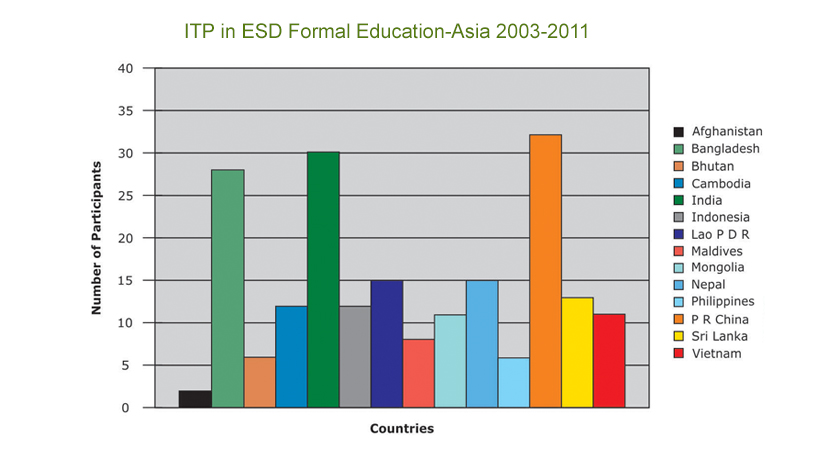 |
|
|
 |
Showcasing SIDA sponsored ‘ITP in ESD in Formal Education’ at ITP Results Seminar |
The Swedish International Development Cooperation Agency (SIDA) organized an International Training Programme (ITP) in Higher Education Results Seminar at Rhodes University, South Africa, which was also used as an opportunity to review and present the achievements of the SIDA sponsored ITP in ESD in Formal Education.
Ms. Carol D’souza, Programme Officer, Networking and Capacity Building, CEE, represented the Centre at this ITP Results Seminar. Carol highlighted this significant global experiment that led to and created an effective strategy and design for training professionals on-the-job—using ‘an institutional team’ as a unit of change to improvise the formal education work. She shared the details of supporting adult learning and training through the ITP so that the professionals could manage change in their work places better, could integrate and strengthen sustainability education aspects into existing policies, develop new strategies or programmes, curricula and adopt new teaching-learning approaches into the formal education system.
While ‘Change Stories’ were shared at the ITP Results Seminar, critical thoughts on the programme were highlighted too. The challenges of supporting participants to generate innovative solutions for key concerns in Formal Education were highlighted, even as reflections of enhancing the benefits of a work-based distance-education programme by using technology were shared.
ITP in ESD in Formal Education was a programme specially designed for persons qualified to participate in reform processes of strategic importance on different levels. Financed by SIDA, the Programme was globally coordinated by Niras Natura for 2002-2011. CEE India has been the Asia Coordination Partner in this initiative.
|
 |
|
|
|
|
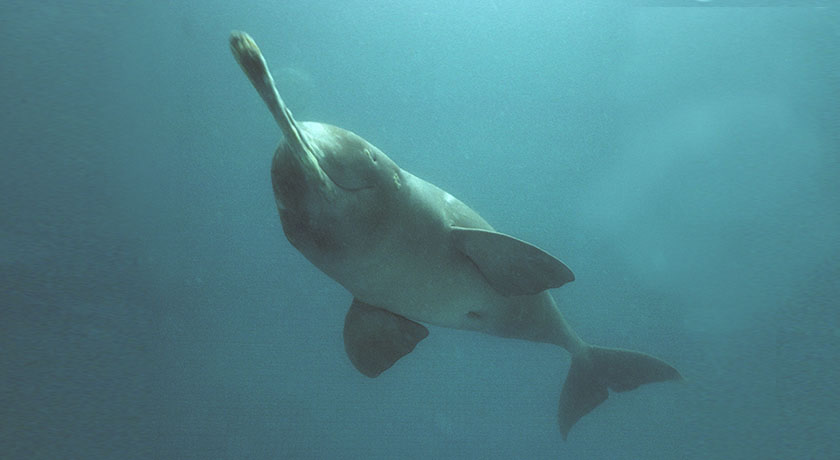 |
| Teachers were oriented in conducting classroom activities using dolphin educational package. |
 |
|
Ganges river dolphin Cluster Workshops |
CEE, with support from the National Mission for Clean Ganga under the National Ganga River Basin Authority, is implementing the Ganges river dolphin conservation education programme Phase II. As part of the school component, CEE North is working on 20 locations in Ganga Basin, covering 10 each in Uttar Pradesh and Bihar. With the initiation of activities, CEE has identified local partner NGOs where school clusters were formed involving 35 schools residing close to the river bank ranging from 3-5 kilometers. During November and December, over 6 workshops were conducted by CEE with the help of local partner NGOs and the education department.
In the month of November, three cluster level teachers trainings were organized, covering Katerniaghat, Hastinapur and Bhagalpur. Over 200 teachers participated in these workshops, which aimed at orienting the teachers on the formation of dolphin clubs in their school, conducting curriculum focused classroom activities using dolphin educational package and organizing school level and community level awareness programmes. Each cluster developed their strategy for dolphin awareness activities.
|
 |
|
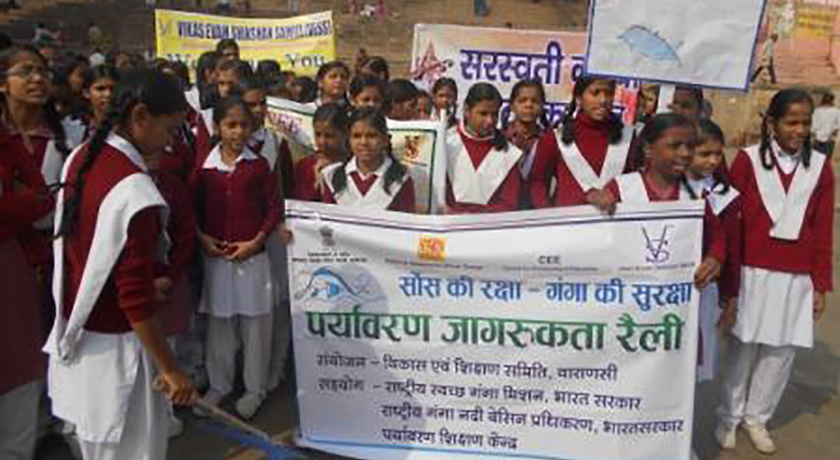 |
| A human chain was formed to pledge to work for the protection of the river and its animals. |
 |
Dolphin awareness rally and ghat cleaning at Varanasi |
As part of the Ganges River Dolphin – Conservation Education Programme, students of Saraswati Kanya Inter College, Neelkanth, Varanasi, took out a Dolphin Awareness Rally in Varanasi on 25th November, 2014. Over 300 students, teachers, social workers, volunteers and environmentalists took part and walked for nearly 2 km, with the students carrying placards, banners and posters appealing to the people to save Environment and aquatic animals. They also spoke about safeguarding the Dolphins and other aquatic animals with a view to keep the river clean and pollution free. The rally passed through Neelkanth Chowk, Godwaliya, Lalita ghat, Dashswamedh Ghat and Dr. Rajendra Prasad Ghat. Later, the girls offered shramdan to clean the Ghats.
A human chain was formed at Rajendra Prasad Ghat to pledge to work for the protection of the river and its animals. The students also staged a street play to mobilize and make the people aware about the issues threatening the Ganga and its biodiversity, and how they could prevent it. The play put forth concerns related to over and unauthorized fishing, waste dumping near Ganga, problems of Pandas (pujari / priest), throwing puja garbage, floating dead bodies, cloth washing etc. A song by the students and a poster exhibition on Dolphin was also arranged at the Ghat. CEE - with support from the local partner agency VESS - guided the students in conducting the event.
|
 |
|
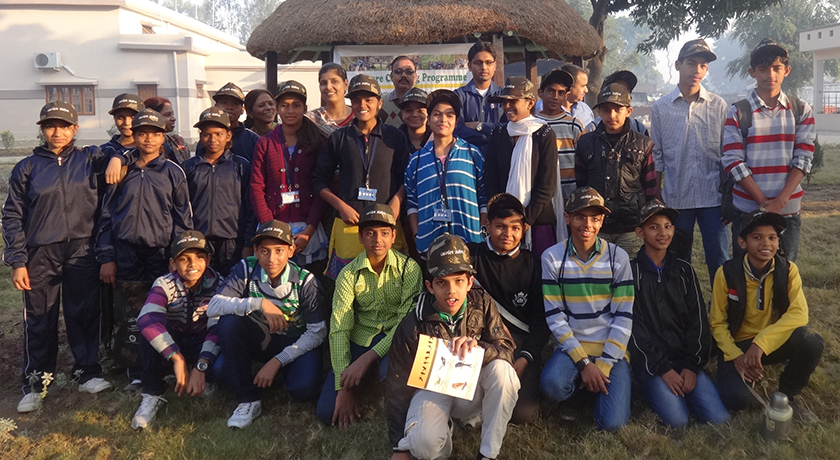 |
| The nature camp module was woven around various aspects of nature and cultural heritage. |
 |
Nature Camp at Katerniaghat |
On the occasion of Children's day, CEE North and Uttar Pradesh Forest Corporation (UPFC) conducted a nature camp for the children of city-based schools. Accompanied by the CEE team, 24 students from 4 schools of Lucknow, along with 5 teachers, left for a 3 day-2 night camp at Katerniaghat Wildlife Sanctuary, from November 14-16, 2014. Students from classes 6 to 8 of Army Public School, Riverside Academy School, Swami Yoganand Inter College and Kasturba Gandhi Balika Vidyalaya, Bakshi Ka Talab, joined the camp. The nature camp module was woven around various aspects of nature and cultural heritage. Students went on an exciting nature trail to know the forest closely and observe the animals around, even as the boat ride in Girwa River familiarized them with aquatic biodiversity, including gharial, crocodiles, water birds and dolphins. They were equally amazed to see the rare sight of big groups of vultures. Interaction with members of the Tharu tribal community turned out to be a memorable experience for the students. |
|
 |
|
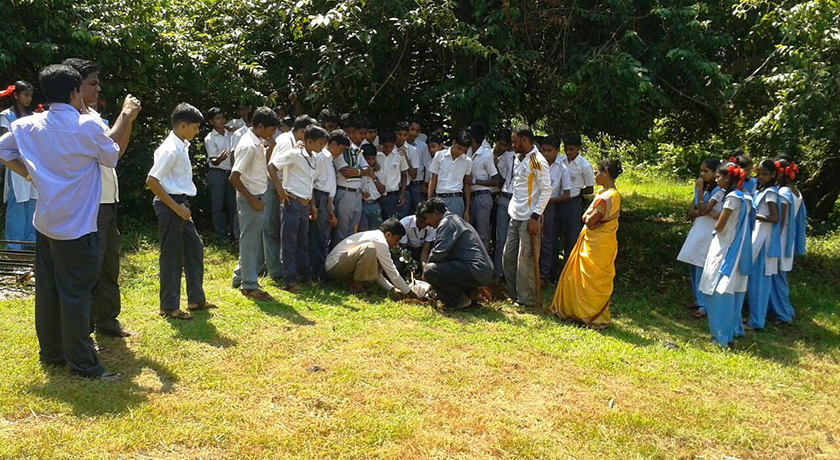 |
| Students planting Apta saplings. |
 |
|
ESS School celebrates Dussehra in Ratnagiri |
The ESS eco-club of New English School at Solgav in Ratnagiri district celebrated the festival of Dussehra in October. The activity began with an awareness rally that started from the school, passed through the village and culminated at the local temple Saraswati Mandir. The eco club in-charge teacher addressed the gathering and spoke of the relationships between festivals and plants, citing references from holy books and giving examples of the value of these plants in our day-to-day life. The large scale exploitation of the plants today, for example Apta (Bauhinia racemosa) during Dussehra, was of concern he said.
During the festival, instead of offering leaves, saplings of the plants raised by students in school nurseries were distributed. Seeds were collected few months back from the nearby areas by the students themselves. The Sarpanch and upsarpanch planted the apta saplings in the temple premises, and the students took an oath to plant and raise 100 apta saplings by next Dussehra. |
|
|
 |
|
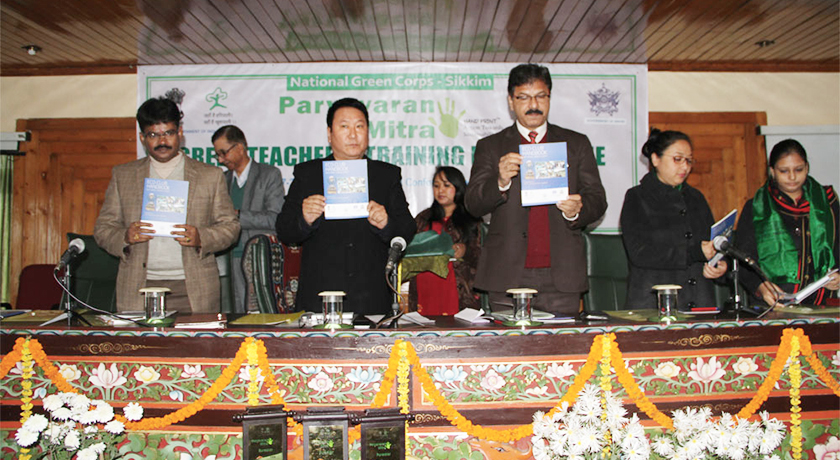 |
| The training aims at strengthening the NGC eco-club programme in junior high schools. |
 |
|
NGC Teacher Training in Sikkim |
ENVIS Centre at Forests, Environment and Wildlife Management Department, Government of Sikkim (NGC Nodal Agency in Sikkim) organized a two day eco-club teachers training programme on 27th and 28th November, 2014.
The inaugural session of the programme was chaired by Hon’ble Minister Forest Mr. Tshering Wangdi Lepcha, PCCF cum Principal Secretary Dr. Thomas Chandy IFS, CCF (T/HQ), Mr. C.S. Rao and CCF /OSD cum Programme Coordinator Mr. B.K. Tiwari. On the occasion, the Hon’ble Minister released the ‘ECO CLUB HANDBOOK’ developed by the ENVIS centre.
100 teachers from North and East districts were trained on the first day and 100 teachers from South and West districts on the second day. The training was conducted in an interactive manner through curriculum linkages, role plays, eco- games, brainstorming session on eco-club activities and AV shows. CEE resource persons Himashree Bhattacharyya from CEE North East and Meghna Thapa from CEE Gangtok imparted the training. CEE is the NGC resource agency for 15 states and U.Ts including Sikkim.
The ECO CLUB HANDBOOK and training is an effort to strengthen the NGC eco-club programme in Junior High Schools of Sikkim.
|
|
|
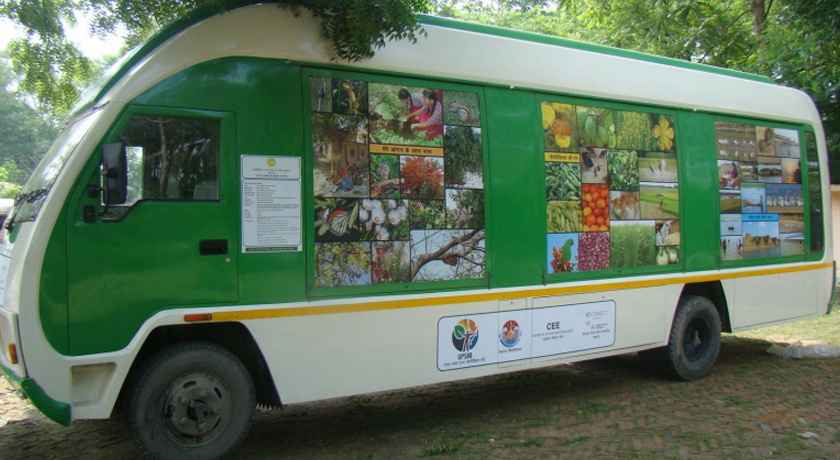 |
ESD through mobile exhibition. |
 |
Recognition award to RCE Lucknow |
RCE Lucknow has received the RCE award certificate for its biodiversity focused ESD initiative at the 9th Global RCE Conference held at Okayama, Japan. Among 27 RCEs’ submissions, RCE Lucknow's project 'ESD through mobile exhibition on biodiversity' has been awarded a certificate of honorable mention in the category of Curriculum-based Transformative Learning and Research processes.
|
 |
|
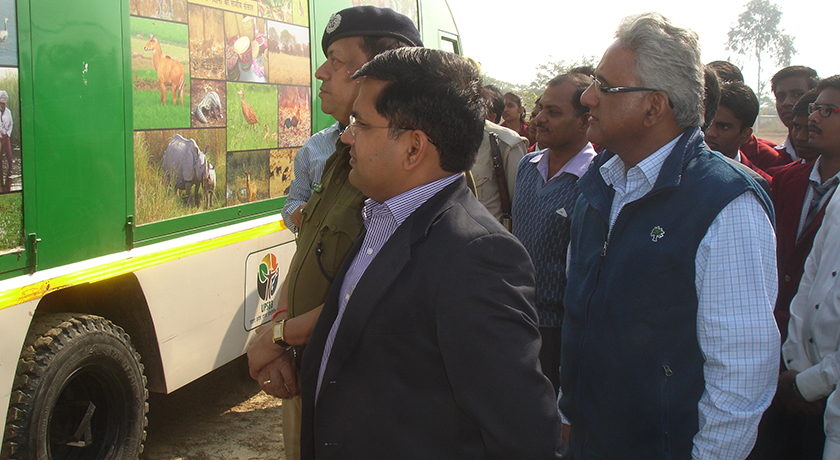 |
| The mobile exhibition highlights the biodiversity of Uttar Pradesh. |
 |
|
Prakriti Bus travels to Kannuaj district |
Taking its journey forward from Lucknow and Barabanki districts, Prakriti Bus reached Kannauj district on 17th November 2014. A launch event was organized at Jawahar Nawodaya Vidyalaya, Kannauj where over 350 students, teachers and community members participated in the programme. The bus was formally launched by Chief Guest Mr. Anuj Kumar Jha, District Magistrate, Kannauj, along with Mr. A.K. Jain, SP Kannauj, Mr. R.K. Singh, DFO Kannauj and Mr. C.S. Yadav, DIOS, Kannauj.
Mr. M. Saxena, Principal, Jawahar Navodaya Vidyalaya welcomed the guests to his school campus and district. CEE representative Mr. Neeraj K. Pal briefed the audience about Prakriti bus and its objective. After his briefing, he invited the guests for the formal inauguration of the Prakriti Bus. In his inaugural address, the Chief Guest Mr. Jha emphasized on the importance of biodiversity and genetic diversity. Stating the scope of biodiversity, he spoke of how, in the future, genes to make the human body cancer-resistant could be developed. Appreciating the bus Mr. Jha said that it was informative and educative, and encouraged the students to learn from it.
The mobile exhibition highlights the biodiversity of Uttar Pradesh, and has been developed by CEE, with support from the UP State Biodiversity Board and University of Lucknow. |
 |
|
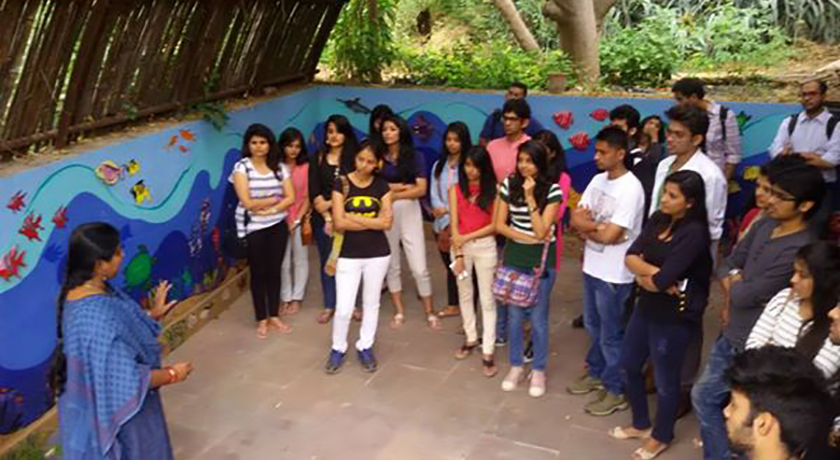 |
| The Information Facilitation Centre gave a brief orientation of the Centre and its programmes to the students. |
 |
|
Budding architects @ CEE |
As a part of their curriculum to study the architecture of office buildings, students of B. Arch from Indian Education Society's College of Architecture (IES CoA) - under the University of Mumbai – visited the CEE Ahmedabad campus.
The Information Facilitation Centre (IFC) of CEE gave a brief orientation of the Centre and its programmes to the students, and also stated how the architecture of the buildings had been attuned to meet these requirements. The manner in which the buildings were built around the trees and how rainwater was harvested helped the professors in discussing the concept of green buildings and green campuses with the students.
The extensive use of mezzanine spaces in each of the buildings and how this facilitated the coming together of the entire team for larger projects was deeply appreciated by the professors and the students. The construction of the Studio fascinated them equally as it has four levels on different floors, but each placed at the ground level structurally. The interconnectedness these floors enjoyed - despite being separate - made the visitors appreciate the landscape of the CEE campus. A copy of the structural plan’s blue-print was used to explain the various office spaces, their purpose and the activities they undertake. |
|
 |
|
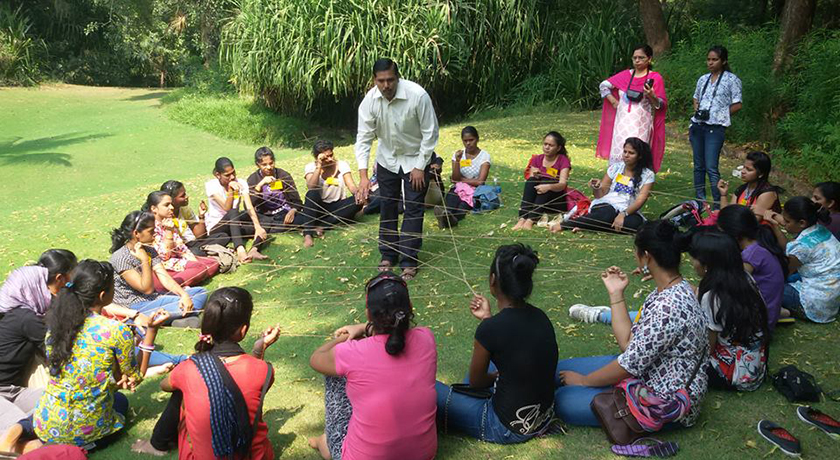 |
| Students were guided and encouraged to participate in environmental games. |
 |
|
Zoology students from Goa visit CEE |
A group of 24 young students of third year B.Sc. Zoology (Semester VI), accompanied by faculty members Dr. Subhadra Devi Gadi and Ms. Claxe Vaz from Carmel College of Arts, Science & Commerce for Women, Nuvem, Goa - affiliated to Goa University - visited CEE on 12th November, 2014. Ms. Priya Nair, In-charge of the Centre’s Information Facilitation Centre (IFC), gave the students a brief overview of the Centre’s programmes and activities. Mr. N. Ramjee, Programme Co-ordinator, took the students on a nature-trail-cum-campus walk to explain the process of participatory eco-restoration processes that ensured greenery in the campus. The sighting of Hanuman Langurs and Indian Peafowl in large numbers inside the campus left the students astounded.
As an effort to introduce the active teaching-learning process, students were guided and encouraged to participate in environmental games.
|
 |
|
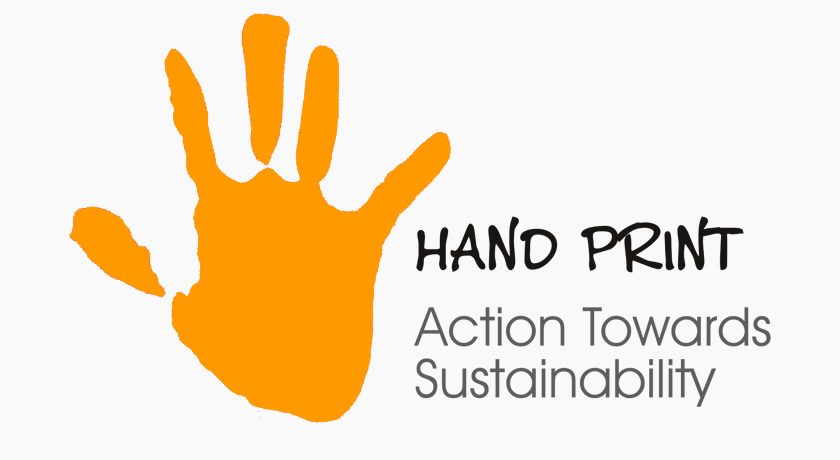 |
 |
|
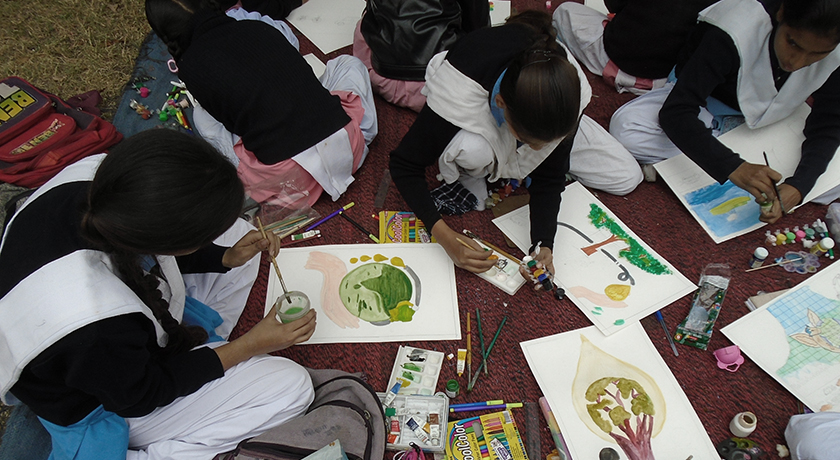 |
| Over 600 students from five districts of Uttar Pradesh participated in the painting and essay writing competitions. |
 |
|
PCRA painting and essay competitions in UP and Bihar |
As part of Paryavaran Mitra and NGC programme, CEE North - in collaboration with Petroleum Conservation and Research Association (PCRA) - organized painting and essay writing competitions in Uttar Pradesh and Bihar. Over 600 students from five districts of Uttar Pradesh participated in the painting and essay writing competitions, which had ‘Conservation of Oil and Gas’ as its theme. Students had the liberty to share their views in their regional languages - making it easier for them to express themselves. Entries of the essay competition were in various languages including English, Hindi, Urdu and Punjabi. In Bihar, the PCRA competitions were conducted with the help of the partner organization - Gram Pragati. Over 600 students participated from West Champaran district, and entries were received in Hindi and Urdu. |
 |
|
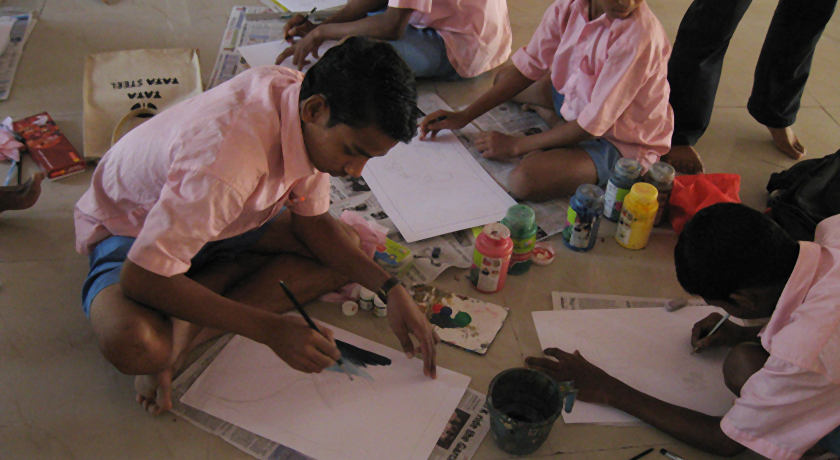 |
| Interactions with students focused on the need for conservation of petroleum and natural gas. |
 |
|
PCRA painting and essay competition in Odisha |
CEE Odisha State Office conducted painting and essay writing competitions under the Petroleum Conservation Research Association (PCRA) supported national level competition - at Bhubaneswar on 25th November, and one event each on 26-27 November at Berhampur in Pattamundai block of Kendrapada district. The events witnessed participation of 400 students in painting and 417 students in essay writing from 13 schools, which involved urban private schools, rural government schools and tribal schools. Interactions with students focused on the need for conservation of petroleum and natural gas and how crucial it is for a sustainable lifestyle. Mr. Bibhu Prasad Tripathy from CEE coordinated the events, with support from Mr. Bijay Kabi – Director of Action for Protection of Wild Animals (APOWA), Kendrapada, Ms. Saurava Goswami – Teacher, Kalinga Institute of Social Science (KISS), Bhubaneswar, and Ms. Lipika Jena – Teacher, Sankalp Senior Secondary School, Berhampur. |
 |
|
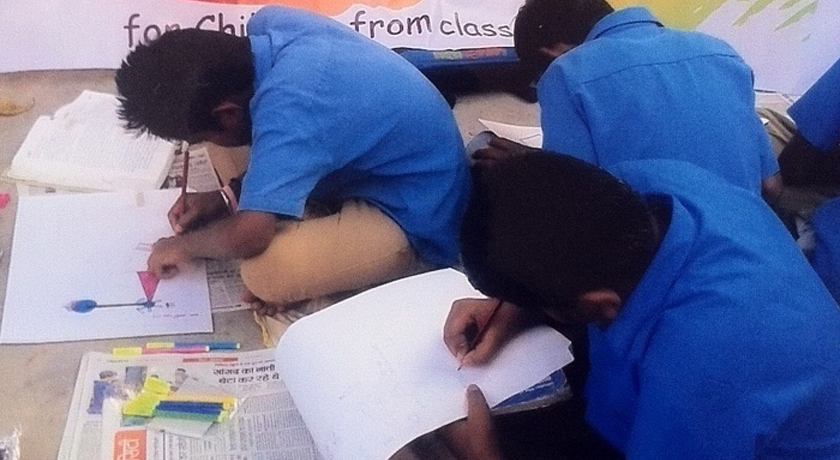 |
|
| Children expressed themselves in a vibrant way on issues pertaining to the use of petroleum products and the measures to conserve them. |
 |
|
National level painting and essay competition in Chhattisgarh |
CEE Chhattisgarh, in partnership with PCRA, organized the national level Painting and Essay Competition in different schools in Raipur. A total of 2259 children took part in the painting events held at their schools. The themes for the competition were “Control wasteful expenditure, save oil & gas for our future” and “Make oil and gas conservation a habit”. 2031 school children participated in the essay competition and expressed their knowledge and opinion on any one of the given themes, i.e. “Role of social media in conserving oil & gas – your take” and “New ways of saving oil & gas in our daily life”.
Altogether 4290 children from 10 different schools participated in the events carried out from 21st to 26th November 2014. Children expressed themselves in a vibrant way on issues pertaining to our lifestyle, use of petroleum products, and the measures to conserve them. The locally formed jury panel selected the winners at the school level. Winning entries from Chhattisgarh will enter the next round while entries from all states will be considered for selection of the most evocative expressions in painting and words.
|
|
|
 |
|
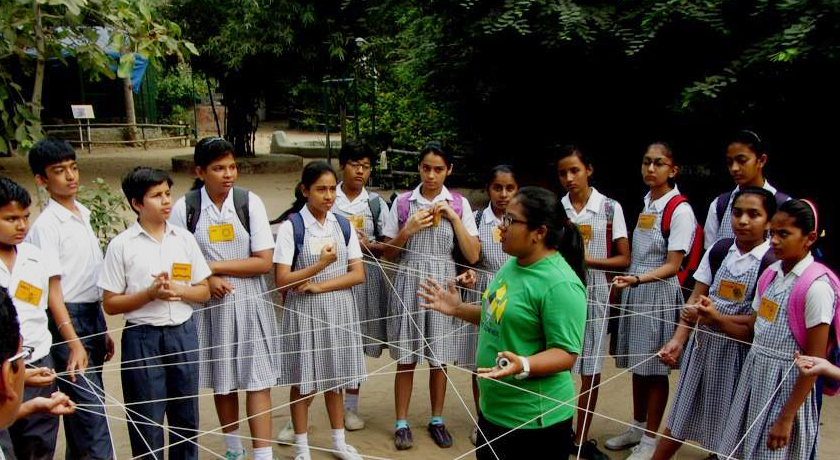 |
Students playing the Web of Life game at Sundarvan. |
 |
Activities at Sundarvan |
Two batches of 44 students each from Rachana School, Ahmedabad, visited Sundarvan, as part of the CEE KA BISCOPE programme on 15th November. The Web of Life game was played as an ice breaker and also so that the students could understand the ecosystem function and components. A nature trail was carried out for them to observe the flora and fauna found in the park, and to understand their role in maintaining eco-balance. A snake awareness programme was also conducted for the students, whereby they posed several questions to know more about the reptiles.
A bat show for children and adults was conducted on 17th November, which involved activities like discussion at the roost site, observation of bat feeding, dispersal of bats from Sundarvan to their foraging site, screening of documentary and bat tattoo making. The participants, especially children, raised many questions to clarify their doubts on bats. A bat mask and cap were given as take-away.
A birthday celebration at Sundarvan on 30th November had a small group of 22 children being taken on a guided zoo visit and nature trail. A snake awareness programme, face painting and other adventure activities were also conducted for them.
|
|
 |
|
CEE is the ENVIS centre on Environmental Education (EE). As an ENVIS centre, CEE caters to the information needs of environmental educators. Write to the CEE ENVIS Centre at [email protected]
|
|
 |
|
| Paryavaran Mitra announces ‘I am Swachh, I am Swasthh’ Campaign |
|
Paryavaran Mitra programme launched the 'I am Swachh, I am Swasthh' campaign, aligning with the all-India Swachh Bharat Abhiyaan. The initiative, which started from 14th November, 2014, aims at engaging the youth beyond photo-ops and stop-gap measures, to focus on long-term actions addressing local waste issues. The campaign urges schools and colleges to create supportive environments for students to take handprint actions. Treating students as the ‘citizens of today’ and not as ‘future citizens, the campaign invites them to identify a local issue and send in their action plans. Further, under the Young Leader for Change initiative, students are guided to take action in the campaign. |
|
 |
 |
This message is sent to you by Centre for Environment Education, Thaltej Tekra, Ahmedabad, India and delivered by [email protected]
© CEE 2014 Editorial team: Bindu Prashanth, Design: Pankaj Gorana |
|
|
|
|